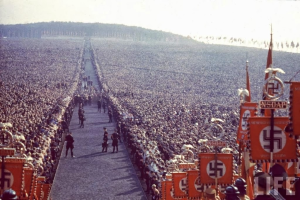The US is in the middle of a low-grade civil insurrection; that’s what all these protests and riots are. (When you torch an entire police station, that counts as insurrection.)
When a civil insurrection happens, riots and protests, and bad stuff will also occur. People will be hurt and killed, property will be damaged. Some of it will be done by the police or military, but some of it will be done by those rising. People will be hurt or killed who don’t deserve it. Property will be torched whose owners didn’t deserve it.
That’s a given. An insurrection is like war: Bad shit will happen to innocents.
This is why the bar for insurrection is high. It’s higher than for war, because, in war, the population and elites think the damage will be done to the other country. (They may turn out wrong, but that’s what they believe.)
So, yeah, bad things have happened during this US insurrection. That was a given, and anyone who thought it would be otherwise is a fool.
This is, however, what elites count on: That the costs of insurrection will be high, and made higher by the elite reaction. Most violent protests were started by riot cops being violent with protesters who were peaceful.
Because the cost is so high, people put up with terrible situations for a long time. The damage drips and is spread out over time and the community, whereas the costs of insurrection are immediate and hit a lot of people more or less at the same time.
The death and casualty count from the US not having universal health care is far higher than any possible casualty count from these riots. Nor have as many people been killed during this insurrection as are killed by cops in the US every year (a number in excess of 1,000).
By the pure math, a very high cost should be acceptable to tear down the current order. If all that did was move police violence to a European number (1k), enact universal health care (26k), end wars (slightly under 1k), and allow the US to deal with a pandemic properly, the saved lives would be 28K yearly, plus a few hundred thousand from the pandemic.
This leaves out people committing suicide, the highest incarceration rate in the world, the epidemic of drug abuse, the death and suffering from inflated drug prices, and all the suffering caused by massive income inequality.
At the most conservative estimate, if you overthrew the current order at the cost of 100,000 lives, it would pay back in five to six years.
The argument for all out revolt, replacing the current system with Nordic style social democracy (Finland/Norway, not Sweden) is airtight if you think you can succeed. (I know many people, observing the US military lose almost every war since WWII, think it is undefeatable in a country far better suited to guerilla warfare even than Afghanistan, but of course, there is a very good chance it would not come to military vs. population.)
No one condones violence that hurts the innocent or destroys the property of innocents. But if you take violence entirely off the menu, and won’t do full social-solidarity general strikes, then a depraved elite (which the US has) will simply ignore you and outwait you.
Minneapolis City council just approved, with every councilor voting for it, a motion to end the Minneapolis police department.
Clutch pearls all you want, but insurrections are always going to be at least somewhat nasty.
But the question isn’t the hurt of the insurrection, the question is whether the status quo after it is better enough to swamp that harm.
Don’t target innocents. Also don’t allow yourself to be held hostage by those who are hurting even more innocents right now, “We can kill tens of thousands and impoverish millions while destroying entire countries, but if you add even one more innocent life to the total opposing us, you are the bad ones.”
No.
(Also, ignore scaremongering about Stalin and Mao. Communism of that variety is long dead and NO ONE is trying to re-impose it.)
If you enjoyed this article, and want me to write more, please DONATE or SUBSCRIBE.

